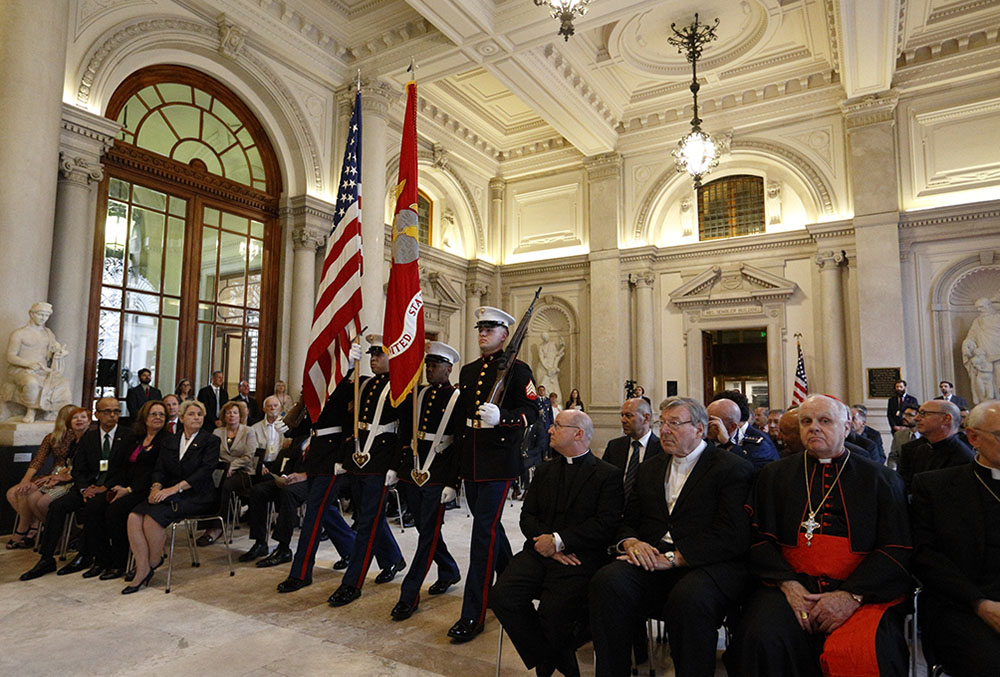
A Marine Corps color guard carries the U.S. and Marine flags during the inauguration of the new headquarters of the U.S. Embassy to the Holy See in Rome Sept. 9, 2015. (CNS/Paul Haring)
On the eve of the U.S.-led invasion of Iraq in 2003, Pope John Paul II sent special emissary Cardinal Pio Laghi to Washington, D.C., to make a desperate, last-minute plea to President George W. Bush not to launch a new war.
Back in Rome, the U.S. Embassy to the Holy See hosted a lecture series using Catholic just war theory to promote the morality of waging a "preventive war" against Iraq. When the U.S. ambassador to the Vatican, James Nicholson, invited conservative Catholic thinker Michael Novak to make the case for war, the event prompted backlash from 60 major American Catholic leaders.
"The U.S. administration was misusing the just war tradition," said Marie Dennis, senior adviser and past co-president of Pax Christi International, one of the organizations that signed an open letter to Nicholson protesting Novak's 2003 lecture. "These moral theologians brought to Rome were apologists for an administration so intent on going to war in Iraq."
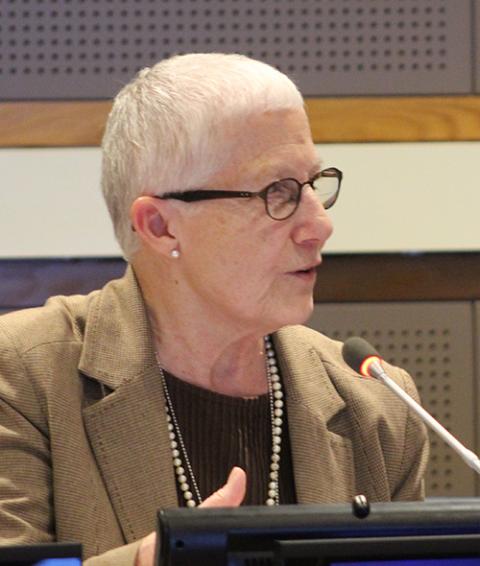
Marie Dennis (NCR photo/Chris Herlinger)
For Dennis, the incident — which heightened diplomatic tensions between the U.S. and the Holy See — is representative of exactly the sort of scenario a Vatican ambassador should avoid.
Yet as President Joe Biden searches for his new Vatican diplomat, Dennis and other experts say the world's smallest state and one of the world's last superpowers find themselves well-situated to have a relationship marked by collaboration, rather than contention.
"If you consider Catholic social teaching, the encyclicals and teachings of Pope Francis and where Biden seems to be trying to go with policy," said Dennis, "then there's a lot of common ground."
Does the nation's second Catholic president really need a representative in Rome?
The United States and the Vatican formally established diplomatic ties in 1984, which means Biden's appointment of a representative to the Holy See will mark the first time a Catholic president has ever picked his point person to the Vatican.
Past ambassadors have included academics, businessmen, a congresswoman, a university president, a former mayor and a film producer.
"In these last 35 years, a special kind of person was sent there," said Villanova University church historian Massimo Faggioli, noting that most Vatican ambassador picks have been an "expression of different Catholic cultures" found in the United States, one that often resembles the brand of Catholicism most closely allied or represented in the administration.
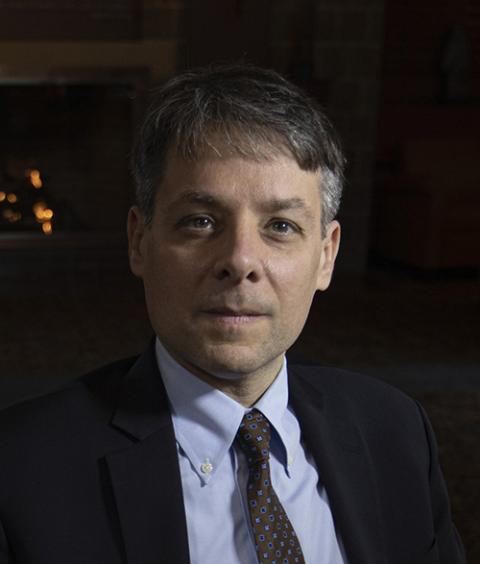
Massimo Faggioli (CNS/Chaz Muth)
What's needed now is someone who understands Francis' approach to politics, Faggioli told NCR.
For Francis, said Faggioli, the church is "not naturally tied to one particular state or regime, but we look for alliances."
While Biden already stands to benefit from a generally positive working relationship with Francis, having spent time with him at the Vatican and during the pope's 2015 visit to the United States, the nation's second Catholic president will still want eyes and ears on the ground in Rome.
"He'll want to pick someone who has the energy to learn the Curia and engage at all the working levels across the various dicasteries," said Shaun Casey, former head of the State Department's Office of Religion and Global Affairs.
Casey, who accompanied former Secretary of State John Kerry on his first diplomatic trip to the Vatican in 2014, told NCR that it will be important for Biden to name an ambassador who is willing to "do [their] homework, and go door-to door before [they] do much in public."
While President Donald Trump's ambassador to the Holy See, Callista Gingrich, focused primarily on issues related to religious freedom and human trafficking, Casey said the Biden administration would be better served by having more expansive engagement.
Ken Hackett, who served as U.S. ambassador to the Holy See during President Barack Obama's second term, concurred, telling NCR "you can't focus on one single issue but you need to engage on a range of issues."
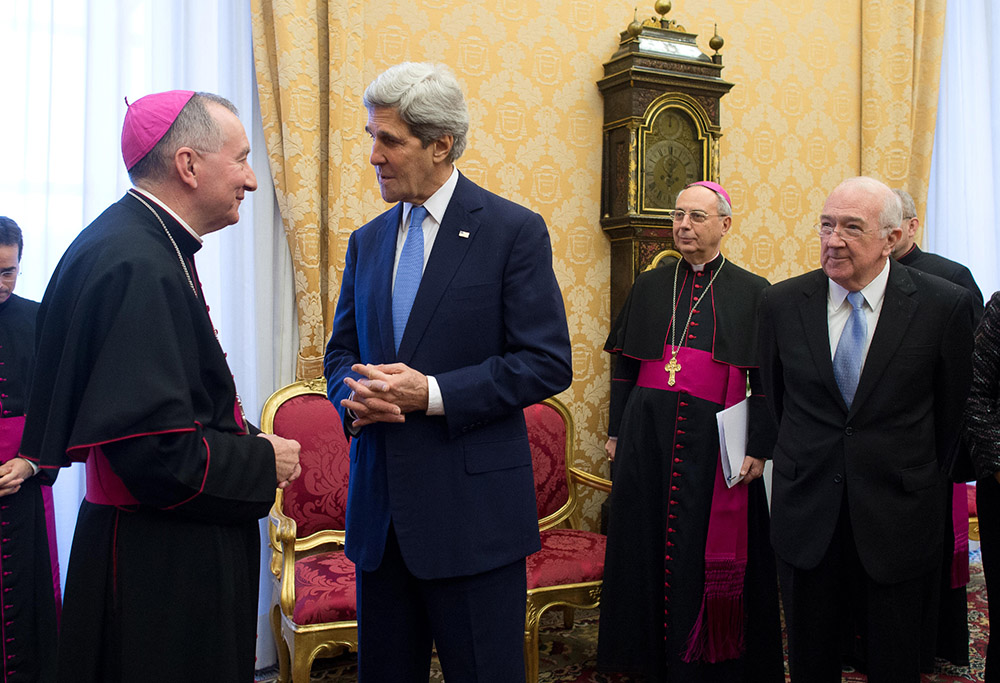
In January 2014, then-Cardinal-designate Pietro Parolin, Vatican secretary of state, meets with his U.S. counterpart in the Obama administration, John Kerry, at the Vatican. At right is Ken Hackett, then U.S. ambassador to the Holy See. (CNS/L'Osservatore Romano, pool)
Biden, he said, must find "someone who can appreciate the Holy See is a global body with a range of interests."
"There aren't many foreign ministries that can take you from one end of the globe to the other like the Holy See does," Hackett added.
What challenges and opportunities will await the new Vatican ambassador in Rome?
When Casey was preparing Kerry in 2014 for his first meeting with the Vatican secretary of state, then-Cardinal-designate Pietro Parolin, Casey estimated that there was at least 70% overlap of issues between the pope's priorities and the Obama administration's agenda.
"I think the Vatican is hoping to find something analogous to that with the Biden administration," Casey surmised.
For Casey, the list of shared concerns remains very similar: the plight of migrants and refugees, climate change, and improving relations with the Muslim world.
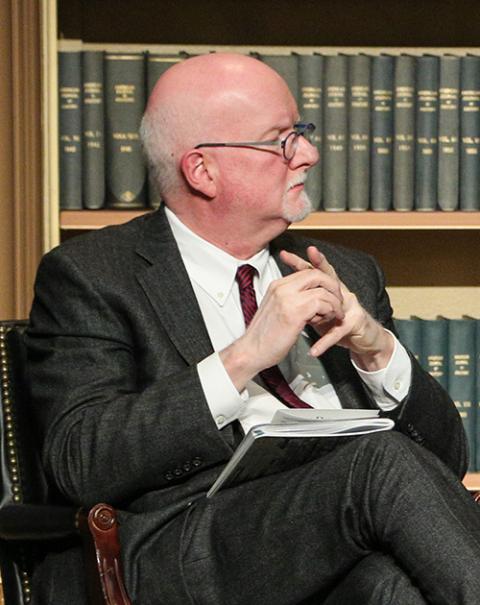
Shaun Casey (CNS/Georgetown University/Shimeng Tong)
"The U.S. could learn from the Vatican as it looks to restore relationships in the Middle East," following the Trump years, said Casey.
In addition, he pointed to China, where the Vatican's recent controversial deal with Beijing over the appointment of bishops has been renewed.
While acknowledging that the deal has its critics, Casey said that the very fact that the Vatican has been able to broker an agreement with China is something to learn from, as "we, too, are trying to recalibrate our relationship" with the megapower.
Faggioli, author of the newly released book Joe Biden and Catholicism in the United States, told NCR that confronting climate change should be the new ambassador's "calling card" when it comes to partnering with the Vatican.
Yet while Faggioli believes there are significant shared priorities between the two states, he noted that there will be tremendous pressure for Biden to "deliver on the huge hopes he has raised among progressive Catholics on issues such as immigration and refugees," and already his Catholic allies at home are holding his feet to the fire as he has been slow to deliver on campaign promises.
Faggioli also said that liberal Catholics will want Biden to stake out progressive policies on women's issues and LGBT concerns, which, according to Faggioli, are "paradoxically not Pope Francis' Catholic culture."
What challenges and opportunities will the new Vatican ambassador face at home?
Last fall, Secretary of State Mike Pompeo spoke at an event sponsored by the U.S. Embassy to the Holy See in Rome, where he offered thinly veiled criticism of Francis' strategy of engagement with the Chinese government.
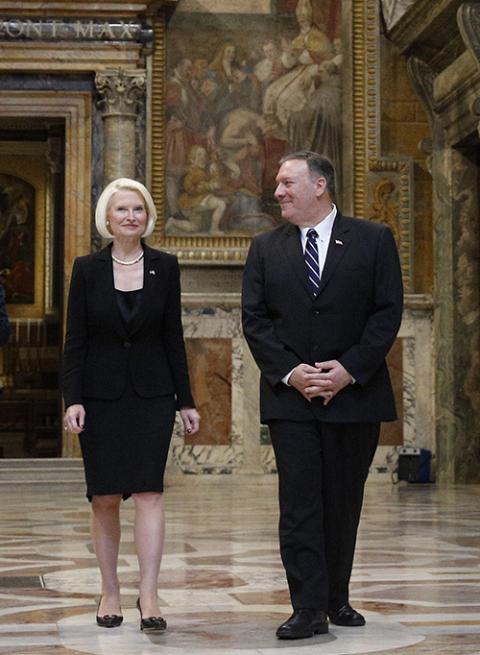
Callista Gingrich, then U.S. ambassador to the Vatican, and Mike Pompeo, then U.S. secretary of state, tour the Vatican Oct. 2, 2019. (CNS/Paul Haring)
The remarks came just days after he published an even more pointed essay criticizing the Vatican's China deal in the conservative magazine First Things.
Recalling the chain of events, Casey described them as "scandalous and bad form," but praised the Holy See for "expressing displeasure pointedly" in a media interview, but not in a way that would interrupt [the] long term relationship with the Vatican and the United States."
In the coming weeks or months as the Biden administration seeks to name its new ambassador, Pax Christi's Dennis said she hopes that the individual will learn from the past and be eager "to listen to and understand Pope Francis' quite unique approach to leading the church and the world," and that the new ambassador will be able "to interpret back to the Biden admin the depth and seriousness of what Pope Francis is trying to do."
Yet one major challenge she foresees: a divided U.S. church hierarchy.
The new U.S. ambassador to the Holy See, said Dennis, may have to help make sense of the "mixed messages" coming from America's bishops, many of whom believe Biden to be a Catholic "in-name-only," due to his support for legal abortion, and have expressed skepticism of Francis, who appears ready to work with Biden.
As such, Faggioli believes the new Vatican ambassador should simply "imitate Pope Francis' approach" to the U.S. bishops.
"Be nice, keep appearances and hold your own line," he said.
Yet given the delicate situation of the U.S. episcopacy, Faggioli said the new Vatican ambassador should not have a particular "Catholic agenda" but rather be motivated by dialogue with the church's bishops and a willingness "to talk to them and open doors" and be "above the nastiness" of intraecclesial politics.
Advertisement
While the bishops of Biden's own country may want him to keep his distance from the pope, Hackett points to the "significant number of active Catholics" in the administration who are "comfortable" with Rome and "recognize the value in engaging with the Holy See."
Reflecting back on his own time as ambassador, Hackett recalled regular visits from fellow Catholics in the Obama administration, such as Kerry; Gina McCarthy, who now serves as the White House national climate adviser; and Lisa Monaco, former Homeland Security adviser.
"I don't think they'll shy away," said Hackett. "They won't be put off by the bishops' hesitancy."
Given this, Hackett said he recently spoke with the interim chargé d'affaires of the embassy to the Holy See, who runs operations until a new ambassador is named, to offer some advice: "He better be ready for a visit from Joe."








